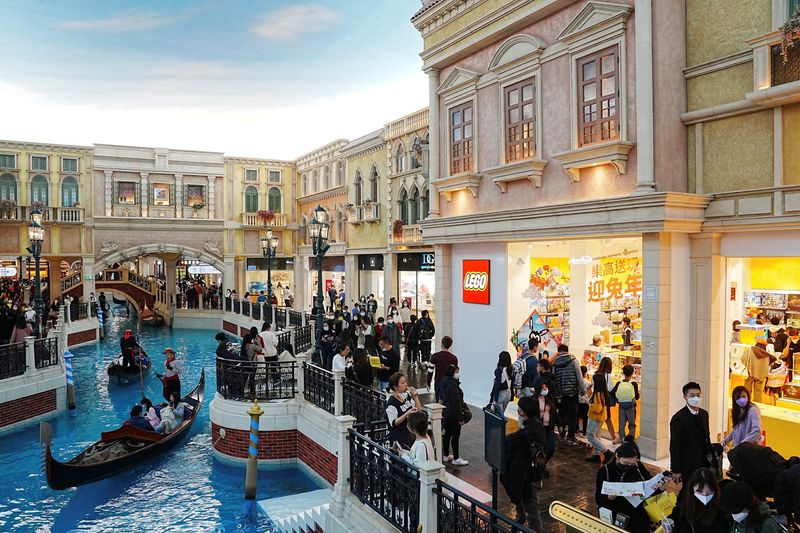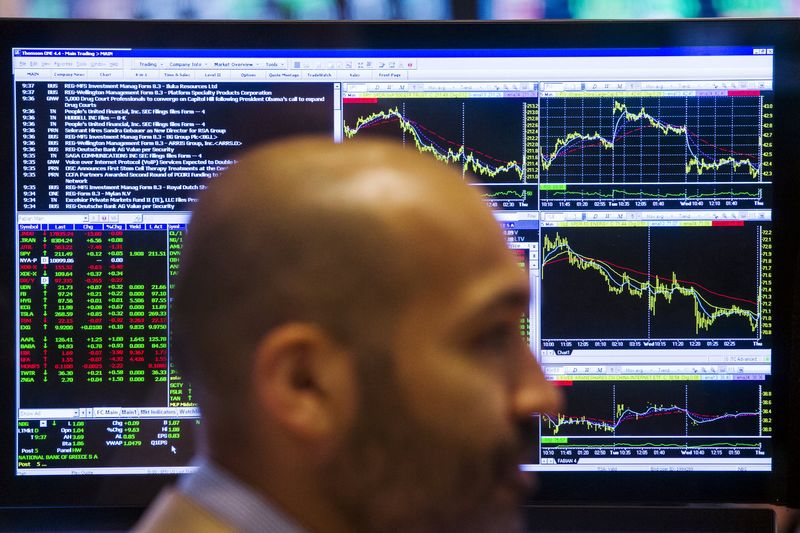By Farah Meester
HONG KONG (Reuters) – A change in the type of customers coming to Macau has led to smaller casino operators MGM China (OTC:) and Wynn Macau (OTC:) are reaping the rewards, while bigger rivals Sands China (OTC:) and Galaxy Entertainment are racing to catch up.
As visitors return to the world’s largest gambling center, the recovery has shifted to affluent premium mass customers, whose individual bets at high-limit baccarat tables range from hundreds of dollars to a few thousand dollars.
The high roller VIP segment, which used to account for the majority of Macau’s revenues, has collapsed due to strict regulations, while the lowest spending mass segment, with minimum bets of around $60, has yet to return is at 2019 levels.
Macau is the only place in China where casino gambling is legal. With expectations for gross domestic product growth of 14% this year, the special administrative region is an outlier as the rest of the country struggles with a slowing economy and sluggish consumption.
“Macau is doing well, but not all operators are benefiting from that recovery,” said DS Kim, an analyst at JPMorgan in Hong Kong.
Big players like Sands and Galaxy have too much exposure to the lower end of the mass market, meaning their share momentum hasn’t been as good as they and the market expected, he said.
Galaxy and Sands China shares have fallen 11.2% and 16.7% respectively since the start of the year, while MGM China and Wynn Macau have risen 46% and 15.7% over the same period.
“With traffic and gaming demand yet to recover to 2019 levels, MGM China and Wynn Macau, given their relatively smaller size and premium mass-oriented businesses, benefit from better operational efficiencies, including marketing and sales to premium customers ” the spokesperson said. Jennifer Song, analyst at Morningstar in Shenzhen.
GAME FACE
Government data shows that visitor numbers to Macau in 2019 are at 75% of pre-pandemic levels, while gambling revenues are expected to reach 80% of pre-pandemic figures this year.
During recent earnings calls, casino operators outlined their growth strategies.
MGM China has benefited most from Macau’s recovery, with its share of gross gaming revenue rising from 9.5% in 2019 to more than 17% this year. It was the only operator to allow an increase in the number of gaming tables under a government reshuffle from January 2023 and it is adding more villas and suites to its properties.
Wynn Macau, which is building a dining room, continues to “punch above our weight on a revenue per hotel room basis and generate significant market share,” said CEO Craig Billings.
But executives at Sands China and Galaxy, which have more tables, say their resorts are well prepared to catch up.
Galaxy will open its high-end Capella Hotel next year and increase demand from the premium mass segment, said Ying Tat Chan, Galaxy’s Chief Financial Officer.
Mass-market Sands China, which closed some hotel rooms and the 15,000-seat show arena for renovation in January, remains the largest operator in Macau.
CEO Grant Chum said revenue per customer was higher than pre-COVID, and as visitor numbers returned to pre-pandemic levels, Sands China would be “best positioned to capture that growth when it presents itself.”
The casino operators did not respond to requests for further comment.
DIVERSIFICATION
The focus on premium visitors also appears to be helping spending on non-gaming activities, which rose 11% to 71 billion patacas ($8.82 billion) in 2023 compared to 2019, Macau’s tourism board said. That’s a welcome sign for authorities, who are forcing casinos to move away from gambling and other attractions like shows, shops and museums.
Any further economic slowdown in China would have a ripple effect on Macau and be felt for the first time in the gambling sector, executives and analysts say. This makes it crucial for casinos to expand their non-gaming facilities to attract a wider variety of visitors.
The non-gaming investments could also boost the casinos by driving more visitor traffic, said Vitaly Umansky, senior analyst at Seaport Research Partners.
Chinese authorities are publicly trying to boost Macau’s appeal, with a top official praising it as the “apple of China’s eye” during a May visit, just days after the central government expanded a plan to attract more mainland visitors to Macau let travel.
Increasing attention is also being paid to attracting visitors outside mainland China, which accounts for 70% of arrivals.
During the first week of May, the top gambler was a non-Chinese patron for the first time.

The high roller was one of more than 190,000 visitors from South Korea this year, now Macau’s largest source of visitors outside Greater China.
($1 = 8.0470 patacas)


